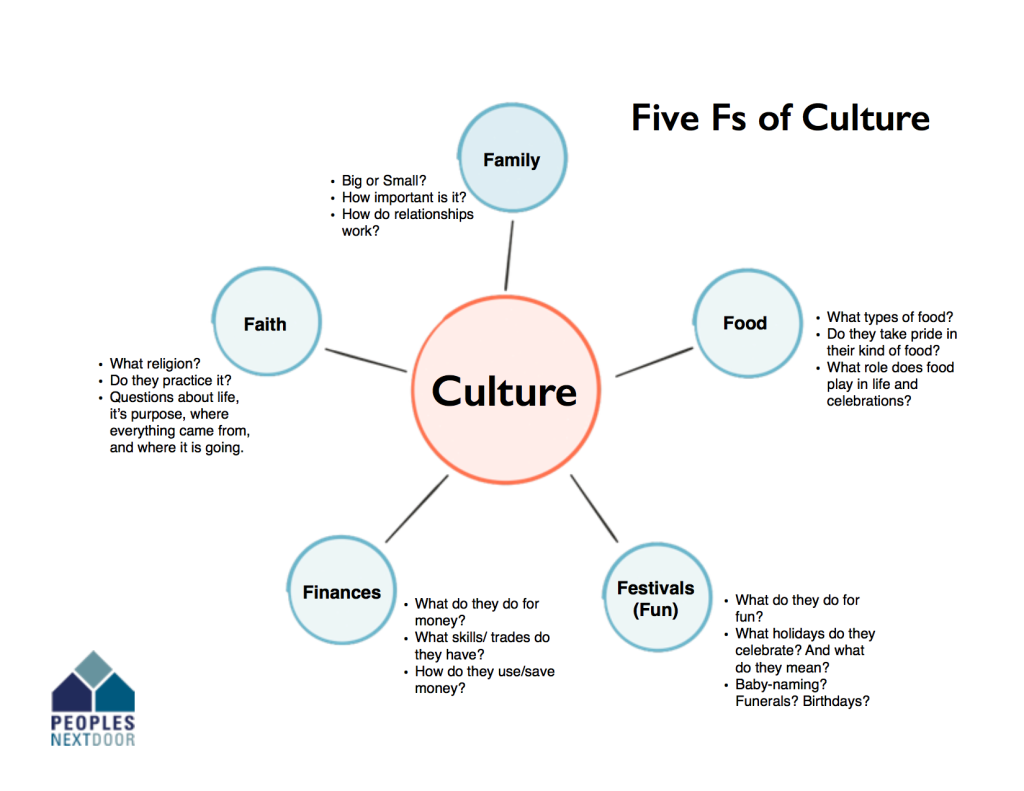Culture in 5 Easy-to-Understand Categories
Let me start by saying this is an oversimplification.
Culture and worldview are complicated topics. Are they the same thing? Are they distinct? Search five textbooks and you will get five different answers and five different definitions. In fact, worldview is a complex conglomeration of any number of factors in someone’s life: metaphysical factors, anthropological factors, theological factors, and the list goes on. If you put a whole bunch of people together with similar worldviews, it tends to manifest itself as culture.
But this post is not concerned with all of that.
Instead, I want to provide a practical tool that, while perhaps oversimplifying culture, gives local church members with no exposure to the above discussion a place to start. In my last post, I wrote briefly about the need to move from cultural expertise to cultural acquisition in our speaking and equipping for work with international peoples in the States. In this post, I plan to pull on that thread again. When I teach and train concerning cultural acquisition in local churches, this is where I start.
Everyone has a worldview and everyone exists in culture.
Think of culture like skin; everyone has it, and while there are a handful of broad shades, everyone’s is a bit different. Culture is also like skin because you wear it without realizing it. People are rarely self-aware of their own culture. In fact, most people think of a culture as something possessed by everyone different from them. Often, the first step in teaching people to be sensitive to other cultures is helping them realize they have one of their own. However, culture does not control people. Worldview and culture shape the way everyone sees the world, but no one’s fate is determined by it. Otherwise, there would be no point in sharing the gospel at all.
Culture is also like an iceberg. While culture manifests in visible ways (think clothing, food, festivals, etc.), it runs much deeper that the surface. Think of the stuff on the surface as being the outward manifestation of inner thoughts and feelings about the world. Because of this, culture definitely colors the way we see things. This truth about culture means that many of the people group communities around your church will understand the world in a very different way than you do. This is why it is essential for us to understand other cultures, if we are to proclaim the gospel in a reasonable way. This does not mean you have to be a cultural expert to talk to them. It does, however, mean that you need to learn about their culture as you begin to engage.
All cultures have 5 basic categories.
Have I mentioned that this is an oversimplification? Nevertheless, any culture (at least that I know of) has five broad categories that outline its shape. These categories often start with surface-level aspects of a culture but can easily reveal deep-level norms and assumptions. Cultural acquisition, or learning about another person’s culture, can be as easy as asking questions that revolve around these five categories. And to make it even simpler, the categories can be explained using five Fs: family, festivals, faith, food, and finances.*
Family
Asking questions about and observing family dynamics is a great place to start when beginning cultural acquisition. How many children do they have? How do they raise their children? Do they view close friends or extended family as brothers and sisters? What words do they use in their language to describe different relationships in the family structure?
Festivals
Festivals may be the most visible piece of a culture. In this category though, I also include things they wear and the activities they do for fun. Certainly, this category overlaps others, but how they spend their free time is an important matter. What do they celebrate? Do they have baby naming ceremonies or particular family celebrations? How do they have a wedding or a funeral? Does their clothing have any significance? If so, what is it?
Faith
This category is perhaps the most obvious for our purposes. What are their religious beliefs? Do not just ask them if they belong to a particular world religion. Knowing someone is Hindu is one thing but stopping there forces you to assume a lot about their beliefs. Instead, ask them specific questions about key religious beliefs. These can be broken down into fundamental beliefs about God, the beginning and end of the world, the problem of sin and evil, and how they see that problem being resolved. With the exception of religious festivals and practices, much of this category lies under the surface influencing everything they do. It is very important.
Food
This may seem like a stretch to Western minds, but most cultures place a high value on their foods. You have a comfort food, and so do they. Questions about food often serve as a front door into other cultures. What do they like to eat? How do they prepare these things? Would they be willing to make you some? Questions like this show an interest in and respect for their culture. It also provides opportunities to demonstrate hospitality, both by accepting invitations from them and inviting them in to your home for an exchange of meals.
Finances
I break this down into two main questions. What do they do for money and provision, and how do they spend their resources? These two questions provide a wealth of information about their current lifestyle and what they value. People spend money on what they value.
By thinking through these five categories, you begin to understand the culture of those people groups you engage. This is a process of discovery, so it will take time and multiple interactions. This is not a survey to hand out at someone’s door. Instead, consider these questions conversation starters with that Hindu lady you meet in the grocery store, or the Muslim gentlemen who owns the Shawarma restaurant down the street. Faithfully asking these questions allows you to discern culture and formulate the gospel in a way that makes sense.
*For those of you who have seen the “Five Fs” in another setting, I am aware that there are various lists. Some include “flags” or “faces” instead of “finances” or “family.” In some circles, these Fs are cast in a negative light (such as education and classroom technique). My particular list is designed with gospel engagement in mind, and serves as a beginning point for dialogue.






